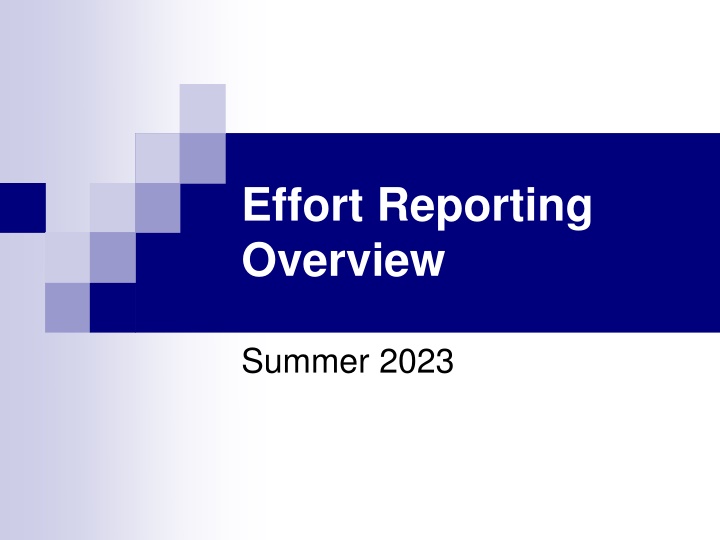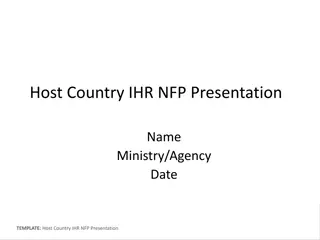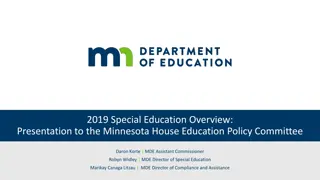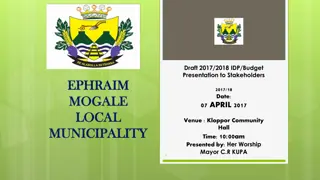
Effort Reporting Overview and Certification Details
Gain awareness of effort reporting, its goals, and importance, including effort certification according to UNT policy. Understand the basics, why it's necessary, and how it differs from payroll distribution to ensure compliance and accurate reporting.
Download Presentation

Please find below an Image/Link to download the presentation.
The content on the website is provided AS IS for your information and personal use only. It may not be sold, licensed, or shared on other websites without obtaining consent from the author. If you encounter any issues during the download, it is possible that the publisher has removed the file from their server.
You are allowed to download the files provided on this website for personal or commercial use, subject to the condition that they are used lawfully. All files are the property of their respective owners.
The content on the website is provided AS IS for your information and personal use only. It may not be sold, licensed, or shared on other websites without obtaining consent from the author.
E N D
Presentation Transcript
Effort Reporting Overview Summer 2023
Goals of Effort Reporting Overview The goals of Effort Reporting Overview are to gain awareness of: What effort reporting is. Why we do it. How we do it. Pre-reviewer role and responsibilities in new effort reporting system.
What is Effort Certification According to the UNT Policy Certification of Effort is a confirmation of the work that has been performed. Each Activity is attributed a percentage of the effort during the reporting period that is reasonable in relation to 100% of total effort for all activities for which an individual is paid by UNT during a specific period. The charge to each award must be appropriate in relation to the work performed.
Effort Reporting Defined Basic Definitions Highlights Effort: Work performed for UNT. Fraction of time devoted to any activity (teaching, committees, research, admin, etc). Expressed as a percentage of total UNT activity. Effort Certification: The act of confirming in that effort is correct and accurate.
Why do we do it and why are we looking at Effort Reporting? Required by federal government. Increased federal focus on effort reporting. Typically the largest cost category. Must minimize audit risk. New effort reporting system Summer 2023 (ECC). New Pre-Reviewer role in ECC system.
Uniform Guidance 2 CFR 200.430: Compensation for Personal Services General Principles: The distribution of salaries and wages is based on payroll. Apportionment of salaries and wages produces an equitable distribution based upon effort and contributed activities. In an academic setting, any method of apportionment recognizes that teaching, research, and service and administration are inextricably intermingled. Therefore, reliance is based upon estimates in which a degree of tolerance is acceptable.
Effort Reporting versus Payroll Distribution Payroll Distribution: The basic distribution of one s salary or origin source of pay Effort Reporting: Describe the allocation of an individual s actual time and effort spent for specific projects, whether or not reimbursed by the sponsor.
What Effort is NOT It is NOT necessarily the same as payroll distribution. It is NOT 40 hours per week.
What is excluded from Effort? Specific short-term assignments (not routine and are compensated separately) One-time payments are not included
Positions normally included Faculty positions with sponsored projects Professional Staff positions who work on sponsored projects Graduate Research Assistants (RAs) / Teaching Assistants (TAs) who work on sponsored projects.
Positions not included Pre- and Post-doctoral individuals supported solely by a fellowship College Work Study employees Individuals whose work is not required to meet certain cost sharing commitments Individuals with Voluntary Uncommitted Cost Sharing (VUCS) toward a project Semi Monthly (Hourly) paid staff and students (Effort recorded on a timesheet)
Effort Reporting for Faculty Sponsored project activities: Academic Year Time (direct charges and cost sharing) Summer Salary (direct charges) Non-sponsored time (included in Instruction and Departmental Research): Teaching Office hours Student advising Departmental research activities Competitive proposal preparation Committee service Departmental meetings Professional development
Effort Reporting for Professional Staff Professional Staff (Monthly Payroll): Total time spent conducting university business regardless of the hours required Example 45 hrs/wk = Project A = 75% 15 hrs/wk = proposal preparation = 25% Or $1,875 Wages/Salary charged to Project A = 75% $625 Wages/Salary from a departmental fund = 25%
Effort Reporting for Graduate RAs / TAs Graduate RAs / TAs: Based upon all activities for which the student receives compensation for his/her appointment(s) Support from fellowships is excluded
Administration of Payroll & Effort Faculty and Professional Staff payroll distribution reported on: Electronic Payroll Action Request (EPAR): Hiring Labor redistributions Terminations
Administration of Payroll & Effort Non-Professional Staff and Students payroll distribution reported on: Timesheets Online EPAR (Labor Redistribution) Sponsored and non-sponsored time should be tracked and charged to appropriate funds.
New UNT Effort Reporting System ECC During the summer of 2023 UNT will be moving to Huron s ECC (Employee Compensation Compliance) application Payroll Affirmation will be done on a semi-annual basis going forward, January 1st June 30thand July 1st December 31st. The initial pre-review time will be the months of August (begin payroll clean up on July 16th) and February (begin payroll clean up on January 16th). PI certification with be done during the months of September and March.
New Pre-Reviewer Role during effort reporting period During the pre-review period Pre-Reviewers will review the Project Statements (payroll) of sponsored projects to ensure that all payroll transactions have been processed and APPEARS accurate All project personnel are listed on grant No Personnel who should not be listed Personnel salaries are correct Personnel cost share data is on the project statement if applicable
ECC Project Statement Pre- review Page
Important Points about Effort Reporting The Principal Investigator (PI) must still review, confirm, and certify that the salary charged and the cost share contributed to the project are accurate. The PI must also review that the salary charged is reasonable in relation to the work performed in support of the project even after a pre-review. In rare occasions, where someone other than the PI certifies (e.g., the chair, laboratory manager or project manager), the method of verification used by the signer should accompany the Project Statement (attachment).
Important Points about Effort Reporting If the effort percentage certified is lower than the payroll distribution percentage, a cost transfer must be made to remove any excess salary charges. Use the correct percentage on the EPAR for direct charges or cost shared payroll to ensure that the person s effort is correctly reported in COGNOS. Project Statement recertification is not required if the amounts charged are substantially correct, often defined as +/- 5 percentage points. Please contact GCA - Isaac Collins or project admin in GCA with any questions!
Project Statements Changes: ECC collects payroll data daily so updated ePAR data should appear the morning after final approval. If a project statement was certified in error and the percentage of effort differs significantly from the employee s actual effort, defined as +/- 5 percentage points of total effort, a project statement can be re- opened by Central Administration (GCA Isaac Collins, Sally Pettyjohn, and Charles Tarantino) then recertified by the PI. Project statements will all be done through the ECC system (there should be no manual project statements).
ECC Best Practices Pre-reviewers should meet with PIs at the beginning of the effort reporting period to determine who will be working on the sponsored project and how much is being paid from the project for all individuals (Meeting should occur between January & February for first period and between July & August for second period). Pre-reviewers should also be aware if a grant has cost share. Cost Share will be set up via an ePAR to document it in the payroll ledgers which will result in it being shown on project statements.
ECC Best Practices cont. Pre-reviewers should also meet with PIs 60 days before the end date of the reporting period to ensure any changes needed to payroll are processed via ePAR to ensure accurate payroll data on projects (May for first reporting period and November for the second reporting period). When the pre-review period opens, complete your review as quickly as possible, due to time constraints on when ePARs must be submitted for fiscal year end/close.
Timeline for System Training Training within ECC will Tuesday July 25thand Thursday July 27thfrom 2:00 3:30pm Instructional documents will be available online at research.unt.edu/grams along with training videos. PI training to begin in August.
Office of Grants and Contracts Research Administration Isaac Collins, Financial Analyst, x2249 isaac.collins@unt.edu Sally Pettyjohn, Sr. Administrative Coordinator; x3940 sally.pettyjohn@unt.edu






















